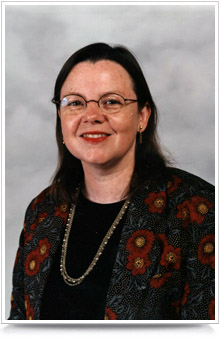
Since its inception in 2005, UNL's Center for Digital Research in the Humanities has been thought of as a pioneer in digital humanities.
With the recent conclusion of the 2013 Digital Humanities Conference, held in Lincoln last week, UNL's reputation is solidified on a global scale, the co-director of UNL's Center for Digital Research in the Humanities said.
CDRH officials learned two years ago that UNL had been selected to host the distinguished conference. After months of planning and preparation, conference organizer Katherine Walter, professor of chair of Digital Initiatives and Special Collections and CDRH co-director, said the conference could not have gone any better.
She credited the success to an outstanding intellectual program and to the hard work of a “large army” of volunteers and event planners.
“Long-standing attendees at DH conferences said it was one of the best they had ever attended,” Walter said, adding that an email she received from a keynote speaker called it “a dazzling success.”
As a host, UNL was able to demonstrate to the world the investment and subsequent achievements the CDRH has had.
“It has helped secure Nebraska's reputation as a center of digital humanities activity, both for the Center for Digital Research in the Humanities itself and for individual humanities departments at UNL,” Walter said. “It was a great opportunity for us to demonstrate what we’ve accomplished and the successes we’ve had.”
Participants were interested in what CDRH faculty had to say -- Walter said an open house at the center gave representatives from universities across the United States a chance to ask questions and see the inner workings of the center.
“Many people from institutions around the U.S. -- especially libraries -- came to ask questions about how we developed our center because they hope to do so, too,” Walter said. “They indicated that they have been following CDRH and have been looking to it as a model.”
Walter said there were other benefits to hosting a conference of this magnitude: “It gave UNL faculty and students who may not have been able to attend an international conference before the opportunity to network with colleagues from around the world, and may help in developing new research partnerships,” she said. “It will also aid in recruiting students to the multi-disciplinary Graduate Certificate in Digital Humanities directed by Matt Jockers.”
Walter said hosting the conference may aid in fundraising for the center’s endowment -- it showcased UNL’s leadership in digital humanities and the involvement of UNL students.
For Walter and co-director Ken Price, the conference is not a culmination but a cornerstone in the center's continuing work. CDRH has flourished with new faculty in the last two years, and is set to add two more.
As a voting member of the Alliance of Digital Humanities Organizations steering committee, which oversees the conference, Walter said the success of conference was personally gratifying and should be regarded as a resounding success for UNL and Lincoln.
“It was wonderful to see colleagues from around the world and to hear their praise of Lincoln and the UNL campus,” she said. “Many attendees commented on the outstanding hospitality of the larger Lincoln and UNL communities.”
The Alliance of Digital Humanities is an organization of six international groups -- the European Association for Digital Humanities, Association for Computers and the Humanities, Canadian Society for Digital Humanities, centerNet, Australasian Association for Digital Humanities and the Japanese Association for Digital Humanities. The alliance is designed to promote and support digital research and teaching across all arts and humanities disciplines. Acting as a community-based advisory group, the alliance supports excellence in research, publication, collaboration and training. The 2014 conference is to be held in Lausanne, Switzerland, and in 2015 in Sydney, Australia.
-- Deann Gayman, University Communications